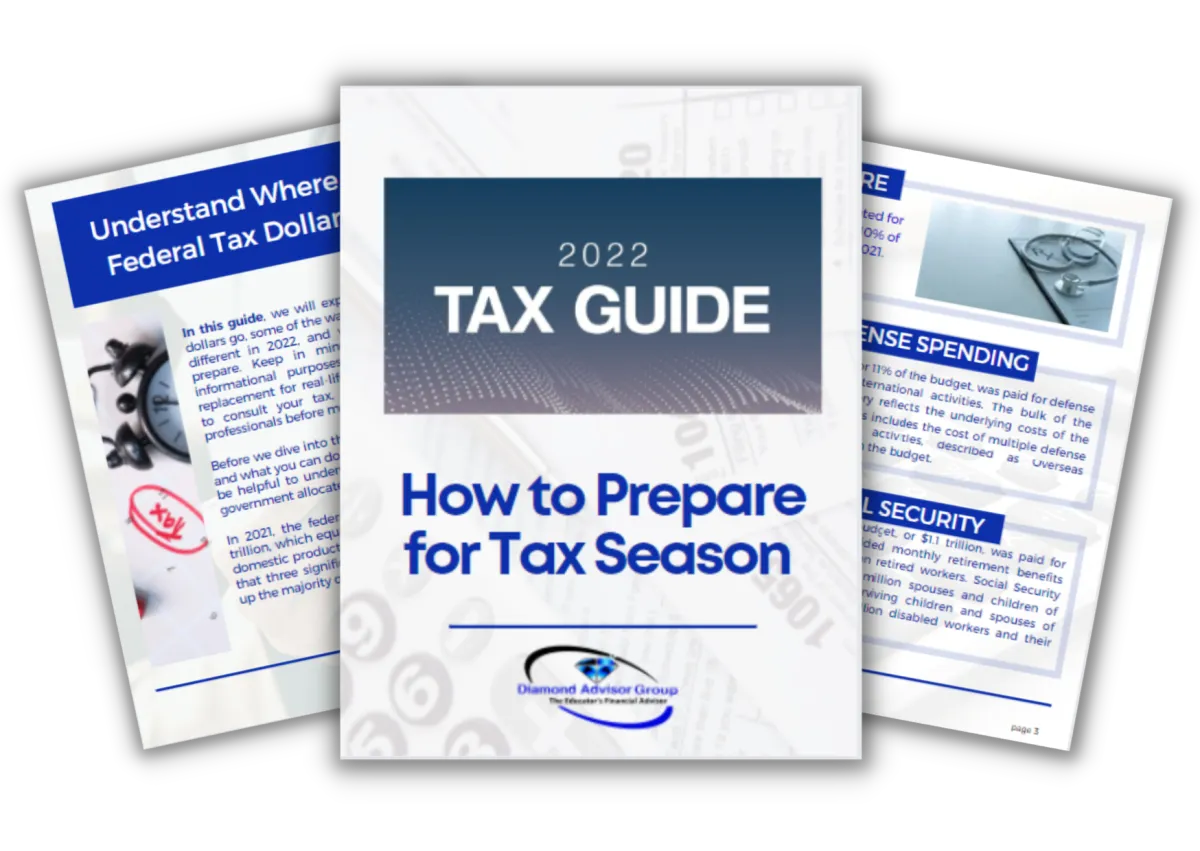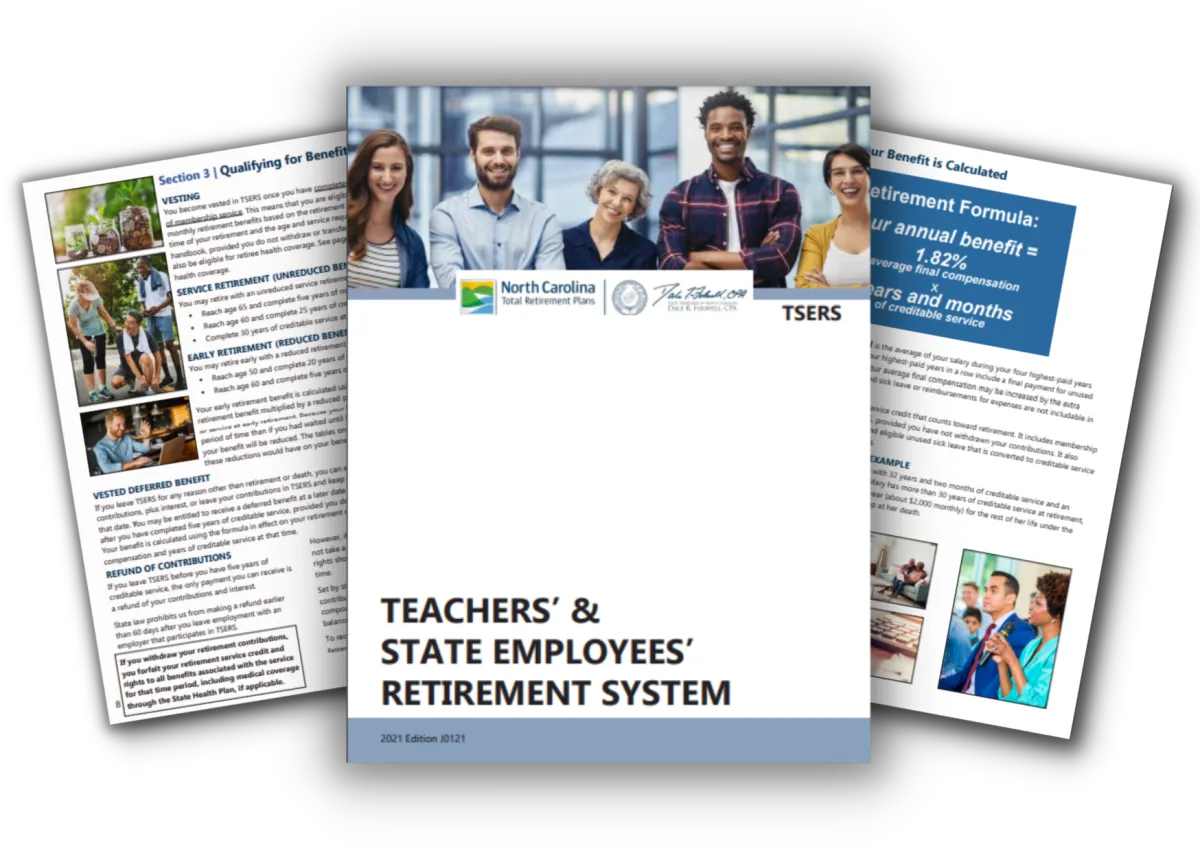

Resources: Blog Articles and Videos
We create free resources about retirement, taxes, estate planning, debt pay-off, budgeting, college planning and
other financial concepts that will help you in planning for your future.
Welcome to our Resource Center
We create free resources about retirement, taxes, estate planning, debt pay-off, budgeting, college planning and
other financial concepts that will help you in planning for your future.
Subscribe To Our Weekly Resource Give Away

7 Essential Steps In
Planning Your Estate
May 18, 2022

9 Facts About
Retirement
May 12, 2022

What You Must Know 5 Years Before Retirement
May 04, 2022

4 Critical Social Security
Facts
April 27, 2022

The Pre-retirement
Checklist
April 20, 2022

Retirement Questions For Educators
April 13, 2022

How Tax Loopholes Will Lessen Your Tax Bills
April 06, 2022

2022 Annual Tax Guide
(How to Prepare for Tax Season)
March 30, 2022

Teachers' & State Employees' Retirement System Handbook
March 23, 2022
Blogs
Navigate the path to financial success with our blog! From savvy investment tips to practical budgeting advice, discover expert insights tailored for you. Secure your financial future with concise, actionable articles designed to empower your journey

Will Social Security REALLY Cover Your Retirement Expenses? The Truth Every North Carolina Teacher Needs to Know!
Will Social Security REALLY Cover Your Retirement Expenses? The Truth Every North Carolina Teacher Needs to Know!
Introduction
If you're a North Carolina teacher, you've dedicated years—probably decades—to shaping young minds. You've endured endless lesson planning, parent-teacher conferences, and that one student who just won’t sit still. But now, as retirement looms, the big question arises: Will Social Security be enough to cover your expenses?
The short answer? Probably not. The long answer? Well, let’s break it all down so you can prepare for a future that’s as stress-free as possible!
Understanding Social Security for North Carolina Teachers
Do North Carolina Teachers Get Social Security?
Unlike teachers in some states, North Carolina teachers DO participate in Social Security. That means you’ve been paying into the system, and when retirement comes knocking, you’ll be eligible for benefits. However, Social Security was never meant to be your sole source of income in retirement.
It was designed as a supplement, not a full-fledged retirement plan. So, while you’ll get some money, it’s important to ask yourself: Will it be enough?
Breaking Down the Numbers: How Much Can You Expect?
How Are Social Security Benefits Calculated?
Your Social Security check is based on:
Your highest 35 years of earnings
When you start claiming benefits (full retirement age vs. early retirement)
How much you’ve paid into the system over time
The Average Social Security Benefit
The average monthly Social Security benefit for retirees in 2024 is around $1,900. However, your actual benefit depends on your specific earnings history. If you retire at full retirement age (67 for most people), you’ll get 100% of your entitled benefits. Retire earlier, and that number shrinks.
For North Carolina teachers, even if you qualify for the maximum Social Security benefit, it’s unlikely to fully replace your salary.
Will Social Security Alone Cover Your Expenses?
Let’s crunch some numbers. According to retirement studies, retirees need at least 70-80% of their pre-retirement income to maintain their standard of living. If you earned $60,000 per year as a teacher, that means you’ll need about $42,000-$48,000 per year in retirement.
Now, compare that to your Social Security check:
Best-case scenario: You receive around $2,500/month ($30,000/year) if you had a high-paying career and retire at full retirement age.
More likely scenario: Your check is closer to $1,900/month ($22,800/year).
Worse-case scenario: You retire early, reducing your monthly benefit even further.
The Reality?
That Social Security check is not going to cover all your living expenses. That’s where your NC Teachers’ Retirement System (NCTRS) pension and other savings come in.
The Role of Your NC Teachers’ Retirement Pension
How the NC Teachers’ Pension Works
As a North Carolina teacher, you have access to the NC Teachers' and State Employees' Retirement System (TSERS) pension. This pension provides a lifetime monthly payment based on your salary and years of service.
Here’s a quick breakdown:
Formula: (Years of Service) × (Average of Your 4 Highest Salary Years) × (1.82%) = Your Annual Pension
Example: 30 years of service × $50,000 final average salary × 1.82% = $27,300 per year ($2,275/month)
This pension helps fill the gap left by Social Security, but it still may not be enough depending on your retirement lifestyle.
How to Make Up the Shortfall
1. Start (or Boost) Your Personal Savings
Beyond Social Security and your pension, it’s crucial to invest in personal retirement savings. Consider these options:
403(b) Plan – A tax-advantaged retirement plan for educators
401(k) or IRA – If you’ve worked outside of teaching, you may have additional savings
Roth IRA – Offers tax-free withdrawals in retirement
The earlier you start, the better. Compounding interest is your best friend!
2. Delay Claiming Social Security
Every year you wait past age 62 to claim Social Security, your monthly benefit increases until you hit age 70. If you can, delay claiming benefits to maximize your check.
3. Reduce Expenses & Plan for Healthcare
One of the biggest retirement expenses? Healthcare. Medicare kicks in at 65, but it doesn’t cover everything. Consider:
Supplemental health insurance
Long-term care insurance
Downsizing to reduce housing costs
FAQs: Your Burning Questions Answered
1. Can I work while collecting Social Security?
Yes, but if you claim before full retirement age, your benefits may be temporarily reduced if you earn above a certain limit. After full retirement age, you can earn as much as you want!
2. How do I estimate my Social Security benefits?
You can check your estimated benefits at www.ssa.gov using their online calculator.
3. What happens if I retire early?
If you retire before age 67, your Social Security benefits will be reduced permanently. For example, retiring at 62 could cut your benefits by up to 30%!
4. What about COLA (Cost-of-Living Adjustments)?
Social Security provides annual COLA increases, but they often don’t keep up with real inflation. Your buying power may decrease over time.
Final Thoughts: What Should You Do Now?
Social Security alone won’t cover your retirement expenses. But that doesn’t mean you’re out of options. Here’s what you should do next:
✅ Calculate your estimated Social Security and pension benefits
✅ Look into additional retirement savings (403(b), IRA, etc.)
✅ Consider delaying Social Security to maximize benefits
✅ Plan for healthcare and unexpected expenses
✅ Talk to a financial advisor to create a solid strategy
Your years of hard work in North Carolina’s classrooms deserve a financially secure and fulfilling retirement. With the right planning, you can ensure that your golden years are truly golden!
🔔 Got questions? Drop them in the comments below!
Want to stay updated on retirement planning? Register now for our weekly live sessions!
Subscribe To Our Weekly Resource Give Away

7 Essential Steps In
Planning Your Estate
May 18, 2022

9 Facts About
Retirement
May 12, 2022

What You Must Know 5 Years Before Retirement
May 04, 2022

4 Critical Social Security
Facts
April 27, 2022

The Pre-retirement
Checklist
April 20, 2022

Retirement Questions For Educators
April 13, 2022

How Tax Loopholes Will Lessen Your Tax Bills
April 06, 2022

2022 Annual Tax Guide
(How to Prepare for Tax Season)
March 30, 2022

Teachers' & State Employees' Retirement System Handbook
March 23, 2022
Blogs
Navigate the path to financial success with our blog! From savvy investment tips to practical budgeting advice, discover expert insights tailored for you. Secure your financial future with concise, actionable articles designed to empower your journey

Will Social Security REALLY Cover Your Retirement Expenses? The Truth Every North Carolina Teacher Needs to Know!
Will Social Security REALLY Cover Your Retirement Expenses? The Truth Every North Carolina Teacher Needs to Know!
Introduction
If you're a North Carolina teacher, you've dedicated years—probably decades—to shaping young minds. You've endured endless lesson planning, parent-teacher conferences, and that one student who just won’t sit still. But now, as retirement looms, the big question arises: Will Social Security be enough to cover your expenses?
The short answer? Probably not. The long answer? Well, let’s break it all down so you can prepare for a future that’s as stress-free as possible!
Understanding Social Security for North Carolina Teachers
Do North Carolina Teachers Get Social Security?
Unlike teachers in some states, North Carolina teachers DO participate in Social Security. That means you’ve been paying into the system, and when retirement comes knocking, you’ll be eligible for benefits. However, Social Security was never meant to be your sole source of income in retirement.
It was designed as a supplement, not a full-fledged retirement plan. So, while you’ll get some money, it’s important to ask yourself: Will it be enough?
Breaking Down the Numbers: How Much Can You Expect?
How Are Social Security Benefits Calculated?
Your Social Security check is based on:
Your highest 35 years of earnings
When you start claiming benefits (full retirement age vs. early retirement)
How much you’ve paid into the system over time
The Average Social Security Benefit
The average monthly Social Security benefit for retirees in 2024 is around $1,900. However, your actual benefit depends on your specific earnings history. If you retire at full retirement age (67 for most people), you’ll get 100% of your entitled benefits. Retire earlier, and that number shrinks.
For North Carolina teachers, even if you qualify for the maximum Social Security benefit, it’s unlikely to fully replace your salary.
Will Social Security Alone Cover Your Expenses?
Let’s crunch some numbers. According to retirement studies, retirees need at least 70-80% of their pre-retirement income to maintain their standard of living. If you earned $60,000 per year as a teacher, that means you’ll need about $42,000-$48,000 per year in retirement.
Now, compare that to your Social Security check:
Best-case scenario: You receive around $2,500/month ($30,000/year) if you had a high-paying career and retire at full retirement age.
More likely scenario: Your check is closer to $1,900/month ($22,800/year).
Worse-case scenario: You retire early, reducing your monthly benefit even further.
The Reality?
That Social Security check is not going to cover all your living expenses. That’s where your NC Teachers’ Retirement System (NCTRS) pension and other savings come in.
The Role of Your NC Teachers’ Retirement Pension
How the NC Teachers’ Pension Works
As a North Carolina teacher, you have access to the NC Teachers' and State Employees' Retirement System (TSERS) pension. This pension provides a lifetime monthly payment based on your salary and years of service.
Here’s a quick breakdown:
Formula: (Years of Service) × (Average of Your 4 Highest Salary Years) × (1.82%) = Your Annual Pension
Example: 30 years of service × $50,000 final average salary × 1.82% = $27,300 per year ($2,275/month)
This pension helps fill the gap left by Social Security, but it still may not be enough depending on your retirement lifestyle.
How to Make Up the Shortfall
1. Start (or Boost) Your Personal Savings
Beyond Social Security and your pension, it’s crucial to invest in personal retirement savings. Consider these options:
403(b) Plan – A tax-advantaged retirement plan for educators
401(k) or IRA – If you’ve worked outside of teaching, you may have additional savings
Roth IRA – Offers tax-free withdrawals in retirement
The earlier you start, the better. Compounding interest is your best friend!
2. Delay Claiming Social Security
Every year you wait past age 62 to claim Social Security, your monthly benefit increases until you hit age 70. If you can, delay claiming benefits to maximize your check.
3. Reduce Expenses & Plan for Healthcare
One of the biggest retirement expenses? Healthcare. Medicare kicks in at 65, but it doesn’t cover everything. Consider:
Supplemental health insurance
Long-term care insurance
Downsizing to reduce housing costs
FAQs: Your Burning Questions Answered
1. Can I work while collecting Social Security?
Yes, but if you claim before full retirement age, your benefits may be temporarily reduced if you earn above a certain limit. After full retirement age, you can earn as much as you want!
2. How do I estimate my Social Security benefits?
You can check your estimated benefits at www.ssa.gov using their online calculator.
3. What happens if I retire early?
If you retire before age 67, your Social Security benefits will be reduced permanently. For example, retiring at 62 could cut your benefits by up to 30%!
4. What about COLA (Cost-of-Living Adjustments)?
Social Security provides annual COLA increases, but they often don’t keep up with real inflation. Your buying power may decrease over time.
Final Thoughts: What Should You Do Now?
Social Security alone won’t cover your retirement expenses. But that doesn’t mean you’re out of options. Here’s what you should do next:
✅ Calculate your estimated Social Security and pension benefits
✅ Look into additional retirement savings (403(b), IRA, etc.)
✅ Consider delaying Social Security to maximize benefits
✅ Plan for healthcare and unexpected expenses
✅ Talk to a financial advisor to create a solid strategy
Your years of hard work in North Carolina’s classrooms deserve a financially secure and fulfilling retirement. With the right planning, you can ensure that your golden years are truly golden!
🔔 Got questions? Drop them in the comments below!
Want to stay updated on retirement planning? Register now for our weekly live sessions!
Other Resources









Subscribe to our weekly resource give away. We create free resources about retirement, taxes, estate planning, debt pay-off, budgeting, college planning and other financial concepts that will help you in planning for your future.
Other Resources









Subscribe to our weekly resource give away. We create free resources about retirement, taxes, estate planning, debt pay-off, budgeting, college planning and other financial concepts that will help you in planning for your future.
Hear From Our Clients
Lorem ipsum dolor sit amet, consectetur adipiscing elit. Nunc elementum scelerisque felis vitae sagittis. Praesent vitae tincidunt sem. Vestibulum nunc risus, placerat non turpis eget, tincidunt tristique magna. Nunc id auctor nisi. Donec iaculis urna faucibus elit rhoncus interdum vel sed elit. Ut bibendum vestibulum sagittis.

David Doe
Simple Company
Lorem ipsum dolor sit amet, consectetur adipiscing elit. Nunc elementum scelerisque felis vitae sagittis. Praesent vitae tincidunt sem. Vestibulum nunc risus, placerat non turpis eget, tincidunt tristique magna. Nunc id auctor nisi. Donec iaculis urna faucibus elit rhoncus interdum vel sed elit. Ut bibendum vestibulum sagittis.

David Doe
Simple Company
Lorem ipsum dolor sit amet, consectetur adipiscing elit. Nunc elementum scelerisque felis vitae sagittis. Praesent vitae tincidunt sem. Vestibulum nunc risus, placerat non turpis eget, tincidunt tristique magna. Nunc id auctor nisi. Donec iaculis urna faucibus elit rhoncus interdum vel sed elit. Ut bibendum vestibulum sagittis.

David Doe
Simple Company
Lorem ipsum dolor sit amet, consectetur adipiscing elit. Nunc elementum scelerisque felis vitae sagittis. Praesent vitae tincidunt sem. Vestibulum nunc risus, placerat non turpis eget, tincidunt tristique magna. Nunc id auctor nisi. Donec iaculis urna faucibus elit rhoncus interdum vel sed elit. Ut bibendum vestibulum sagittis.

David Doe
Simple Company
Lorem ipsum dolor sit amet, consectetur adipiscing elit. Nunc elementum scelerisque felis vitae sagittis. Praesent vitae tincidunt sem. Vestibulum nunc

David Doe
Simple Company
Lorem ipsum dolor sit amet, consectetur adipiscing elit. Nunc elementum scelerisque felis vitae sagittis. Praesent vitae tincidunt sem. Vestibulum nunc

David Doe
Simple Company
Lorem ipsum dolor sit amet, consectetur adipiscing elit. Nunc elementum scelerisque felis vitae sagittis. Praesent vitae tincidunt sem. Vestibulum nunc

David Doe
Simple Company
Lorem ipsum dolor sit amet, consectetur adipiscing elit. Nunc elementum scelerisque felis vitae sagittis. Praesent vitae tincidunt sem. Vestibulum nunc

David Doe
Simple Company
© 2022 Diamond Advisor Group - All Rights Reserved
Disclaimer


